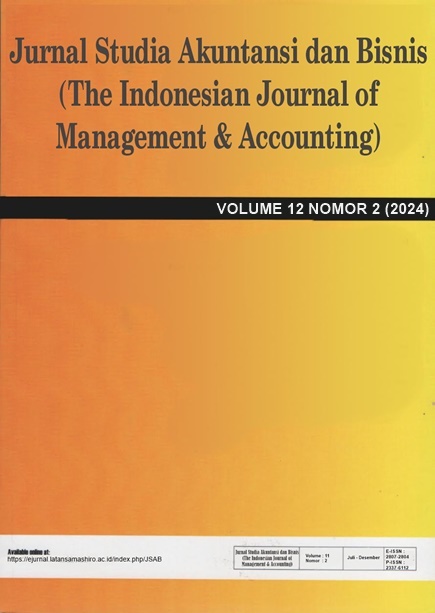TAX AGGRESSIVENESS: FINANCIAL STATEMENT AGGRESSIVENESS AND MANAGERIAL OWNERSHIP IN BANKING COMPANIES IN INDONESIA
DOI:
https://doi.org/10.55171/jsab.v13i1.1410Abstract
The study was conducted to reveal the interaction between financial statement aggressiveness, managerial ownership, and tax aggressiveness. Through SEM-PLS analysis, using Warp-PLS V.8.0 software to obtain test results for each research variable. The study found a positive interaction between financial statement aggressiveness and managerial ownership on tax aggressiveness, indicating that companies exhibit higher levels of aggressiveness in preparing financial statements through creative accounting practices, earlier recognition of revenue, significant deferral of expenses, and the adoption of aggressive strategies in tax obligations. Furthermore, the higher the proportion of shares owned by company managers, the more likely the company is to adopt aggressive strategies. Therefore, this study emphasizes the importance of oversight by financial sector institutions such as the Financial Services Authority and the Directorate General of Taxes, as well as strengthening corporate governance to prevent risky aggressive practices and maintain the stability of the national financial system.References
Allen, A., Francis, B. B., Wu, Q., & Zhao, Y. (2016). Analyst coverage and corporate tax aggressiveness. Journal of Banking & Finance, 73, 84–98. https://doi.org/https://doi.org/10.1016/j.jbankfin.2016.09.004
Badertscher, B. A., Katz, S. P., & Rego, S. O. (2013). The separation of ownership and control and corporate tax avoidance. Journal of Accounting and Economics, 56(2–3), 228–250. https://doi.org/10.1016/j.jacceco.2013.08.005
Besley, T., & Persson, T. (2014). Why do developing countries tax so little? Journal of Economic Perspectives, 28(4), 99–120. https://doi.org/https://doi.org/10.1257/jep.28.4.99
Callahan, C. M., Plečnik, J. M., & Ryou, J. (2023). Do competitive markets encourage tax aggressiveness? Advances in Accounting, 100702. https://doi.org/https://doi.org/10.1016/j.adiac.2023.100702
Chen, S., Chen, X., Cheng, Q., & Shevlin, T. (2010). Are Family Firms More Tax Aggressive Than Non-Family Firms? Journal of Financial Economocs, 95(1), 41–61.
Dechow, P. M., Sloan, R. G., & Sweeney, A. P. (1995). Detecting Earnings Management. In The Accounting Review, 70(20), 193–225.
Frank, M. M., Lynch, L. J., & Rego, S. O. (2009). Tax Reporting Aggressiveness and Its Relation to Aggressive Financial Reporting. The Accounting Review, 84(2), 467–496. https://doi.org/http://www.jstor.org/stable/27802660
Geraldina, I. (2013). Preferensi Manajemen Laba Akrual Atau Manajemen Laba Riil Dalam Aktivitas Tax Shelter. Jurnal Akuntansi Dan Keuangan Indonesia2, 10(2), 206–224. https://doi.org/https://doi.org/10.21002/jaki.2013.11
Ghozali, I. (2013). Aplikasi Analisis Multivariate dengan Program IBM SPSS 21 Update PLS Regresi. Badan Penerbit Universitas Diponegoro Semarang.
Healy, P. M., & Wahlen, J. M. (2005). A Review of the Earnings Management Literature and its Implications for Standard Setting. SSRN Electronic Journal, November. https://doi.org/https://doi.org/10.2139/ssrn.156445
Indrajati, D. W., Sandy, D., & Yuniarwati. (2017). Faktor-Faktor Yang Mempengaruhi Agresivitas Pajak Pada Perusahaan Manufaktur Yang Terdaftar Di Bei 2013– 2015. Jurnal Muara Ilmu Ekonomi Dan Bisnis, 1(1), 125–134. https://doi.org/https://doi.org/10.24912/jmieb.v1i1.415
Jensen, M., & Meckling, W. (1976). Theory of the firm: Managerial behavior, agency costs, and ownership structure. The Economic Nature of the Firm: A Reader, Third Edition, 3(4), 305–360. https://doi.org/10.1017/CBO9780511817410.023
Jones, J. J. (1991). Earnings Management During Import Relief Investigations. Journal of Accounting Research, 29(2), 193–228. https://doi.org/https://doi.org/10.2307/2491047
Kamila, P. A. (2017). Teori agen. Perbanas Institute Jakarta, 16(2), 228–245. https://doi.org/https://journal.perbanas.id/index.php/jkp/issue/view/24
Kontan.co.id. (2018). Pelita Cengkareng gugat balik Molucca dan Bank Permata soal penghindaran pajak. https://nasional.kontan.co.id/news/pelita-cengkareng-gugat-balik-molucca-dan-bank-permata-soal-penghindaran-pajak
Krismonika, M. P., & Tartilla, N. (2020). Pengaruh Agresivitas Pelaporan Keuangan terhadap Agresivitas Pajak dengan Mekanisme Good Corporate Governance sebagai Pemoderasi. Jurnal Ilmiah Akuntansi Kesatuan, 8(2), 157–166. https://doi.org/https://doi.org/10.37641/jiakes.v8i2.374
Krisnugraha, B., Rahayu, T., & Supardiyono, Y. (2022). Pengaruh Manajemen Laba, Ukuran Perusahaan, Likuiditas, dan Profitabilitas terhadap Agresivitas Pajak. EXERO : Journal of Research in Business and Economics, 4(1), 127–153. https://doi.org/https://doi.org/10.24071/exero.v4i1.5028
Lanis, R., & Richardson, G. (2012). Corporate social responsibility and tax aggressiveness: An empirical analysis. Journal of Accounting and Public Policy, 31(1), 86–108. https://doi.org/https://doi.org/10.1016/j.jaccpubpol.2011.10.006
Mafrolla, E., & D’Amico, E. (2016). Tax aggressiveness in family firms and the non- linear entrenchment effect. Journal of Family Business Strategy, 7(3), 178–184. https://doi.org/https://doi.org/10.1016/j.jfbs.2016.08.003
Meckling, W. H., & Jensen, M. C. (1976). Theory of the Firm. Managerial Behavior, Agency Costs and Ownership Structure. https://doi.org/https://doi.org/10.1017/CBO9780511817410.023
Muda, I., & Abubakar, E. (2020). Pengaruh Ukuran Perusahaan, Profitabilitas, Leverage, dan Manajemen Laba terhadap Penghindaran Pajak Dimoderasi oleh Political Connection. Jurnal Riset Akuntansi Dan Keuangan, 8(2), 375–392. https://doi.org/https://doi.org/10.17509/jrak.v8i2.22807
NN. (2016). Diperiksa Ulang, Pajak Bank Panin Tahun 2016 Tembus Rp1,3 Triliun. Cnnindonesia.Com.
Pradhana, A. Z., & Nugrahanto, A. (2021). Agresivitas Pelaporan Keuangan Dan Penghindaran Pajak. Jurnal Pajak Indonesia (Indonesian Tax Review), 5(2), 90–101.
Puspitasari, D., Radita, F., & Firmansyah, A. (2021). Penghindaran Pajak Di Indonesia: Profitabilitas, Leverage, Capital Intensity. Jurnal Riset Akuntansi Tirtayasa, 6(2), 138–152.
Putri, M. K., & Lahaya, I. A. (2023). Pengaruh Manajemen Laba, Profitabilitas Dan Kepemilikan Manajerial Terhadap Agresivitas Pajak. Proceeding of National Conference on Accounting & Finance, 5(8), 72–79. https://doi.org/https://doi.org/10.20885/ncaf.vol5.art8
Ridha, M., & Martani, D. (2014). Analisis terhadap Agresivitas Pajak, Agresivitas Pelaporan Keuangan, Kepemilikan Keluarga, dan tata Kelola Perusahaan di Indonesia. Simposium Nasional Akuntansi, XVII, 24–27.
Rizaty, M. A. (2023). Rasio Pajak Indonesia Naik Jadi 10,39% pada 2022. Dataindonesia.Id.
Scott, W. R. (2015). Financial Accounting Theory (7th ed.). Pearson.
Shintya Devi, D. A. N., & Krisna Dewi, L. G. (2019). Pengaruh Profitabilitas pada Agresivitas Pajak dengan Pengungkapan CSR Sebagai Variabel Moderasi. E- Jurnal Akuntansi, 27(1), 792–821. https://doi.org/https://doi.org/10.24843/eja.2019.v27.i01.p29
Sihombing, A., & Mulyadi, J. (2023). The Effect of Leverage, Company Size, and Profitability on Tax Aggressiveness with Executive Character as a Moderation Variable. Journal of Social Research, 2(6), 1853–1866. https://doi.org/https://doi.org/10.55324/josr.v2i6.922
Steijvers, T., & Niskanen, M. (2014). Tax aggressiveness in private family firms: An agency perspective. Journal of Family Business Strategy, 5(4), 347–357. https://doi.org/https://doi.org/10.1016/j.jfbs.2014.06.001
Susanto, L., Yanti, & Viriany. (2022). Faktor-Faktor Yang Mempengaruhi Agresivitas Pajak. Jurnal Pendidikan Indonesia. Jurnal Pendidikan Indonesia, 3(8), 719–739. https://doi.org/https://doi.org/10.59141/japendi.v3i08.1115
Yunistiyani, V., & Tahar, A. (2017). Corporate Social Responsibility Dan Agresivitas Pelaporan Keuangan Terhadap Agresivitas Pajak Dengan Good Corporate Governance Sebagai Pemoderasi (Studi pada Perusahaan Manufaktur di Bursa Efek Indonesia). Jurnal Ilmiah Akuntansi, 2(1), 1–31. https://doi.org/https://doi.org/10.23887/jia.v2i1.9610
Downloads
Published
Issue
Section
License
Copyright (c) 2025 Ni Made Suwitri Parwati, Chalarce Totanan, Nurlaela Mapparessa, Andi Ainil Mufidah Tanra, Amirah, I Made Ari Kusuma, Ni Luh Dian Sundari Indah

This work is licensed under a Creative Commons Attribution-NonCommercial-ShareAlike 4.0 International License.
This work is licensed under a Creative Commons Attribution-NonCommercial 4.0 International License.





